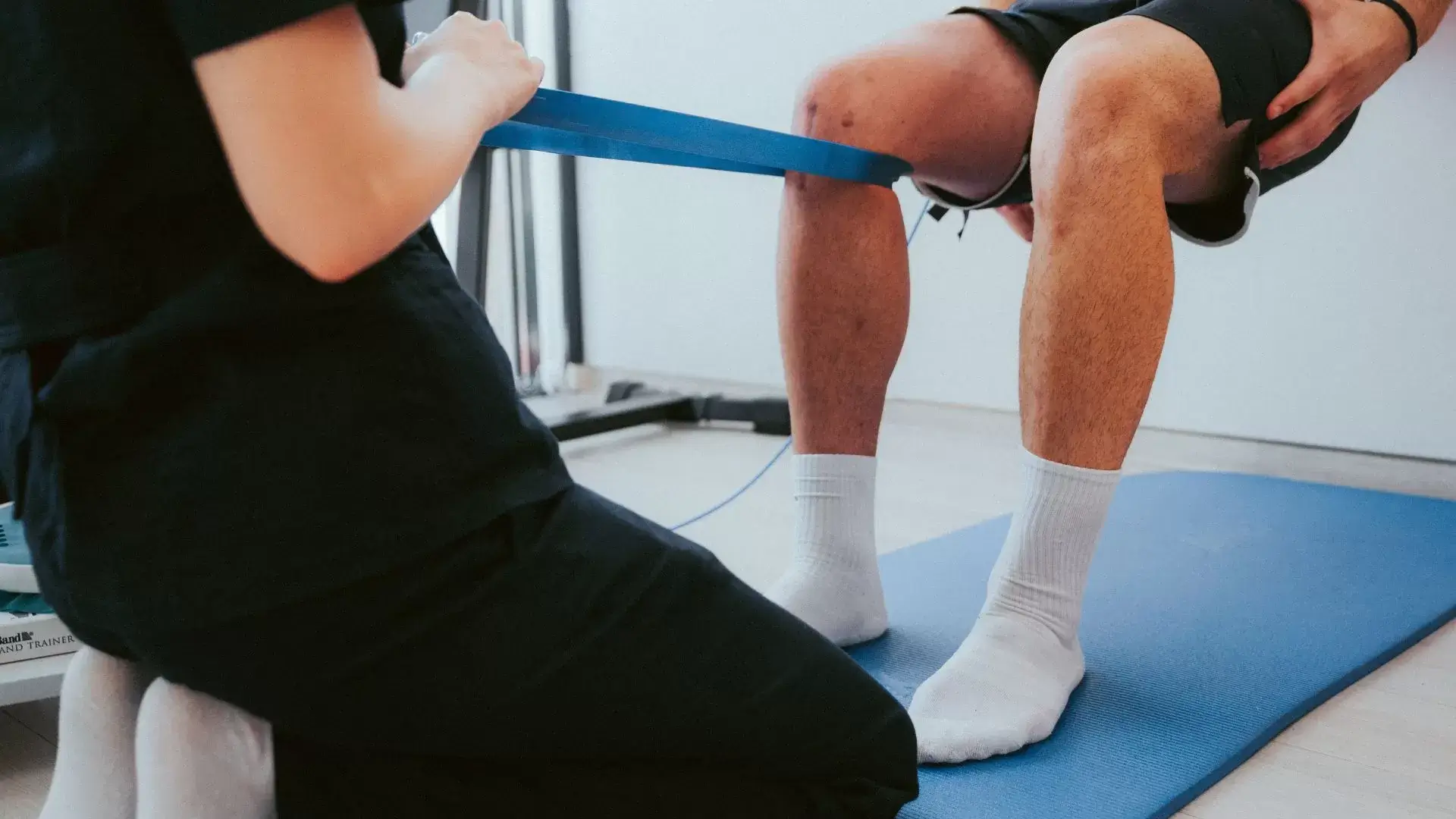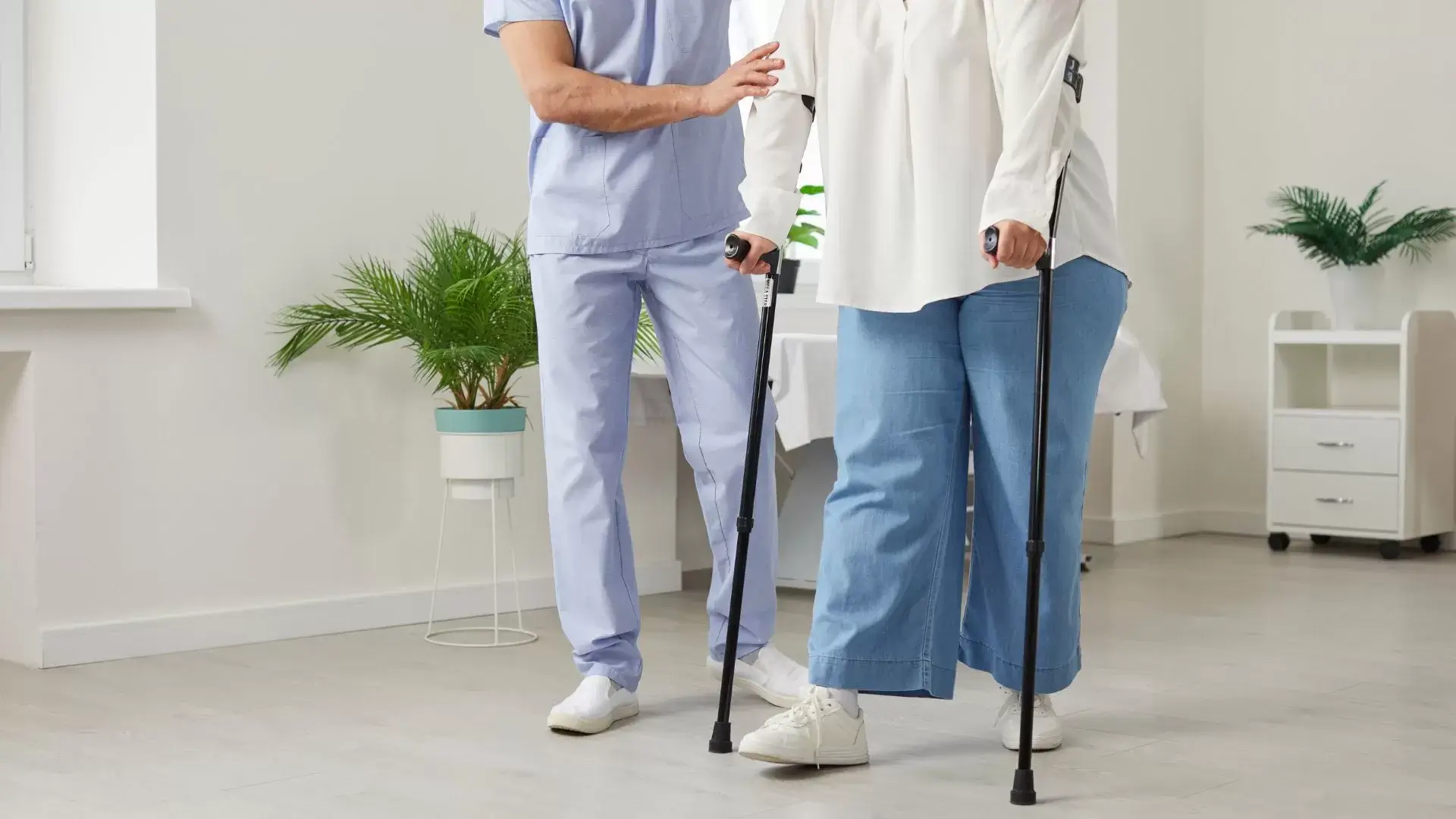We recognize that physiotherapy plays a crucial role in recovery after vehicle accidents. Our patient-centered approach tailors treatment plans to each individual’s needs, addressing both physical and emotional challenges. Common injuries like whiplash, back, and soft tissue damage require specialized care for ideal healing. Early intervention not only enhances recovery outcomes but also reduces the risk of chronic pain. Through evidence-based techniques, we empower our patients to regain strength, function, and quality of life. If you’re interested in understanding our thorough methods and techniques, there’s more we can share about the recovery journey ahead.

At our clinic, we consistently prioritize a patient-centered approach in our physiotherapy and chiropractic services to effectively address the unique needs of individuals recovering from vehicle accidents. We recognize that each case of personal injury, including whiplash and other injuries stemming from traffic accidents, requires tailored treatment plans that promote recovery and restore function.
Our physiotherapy and chiropractic services focus on thorough accident rehabilitation, aiming to alleviate pain and improve mobility. We employ evidence-based techniques to help manage accident trauma and guide individuals through their post-accident therapy. By collaborating with patients, we guarantee they are actively involved in their recovery journey, which enhances treatment outcomes.
We also acknowledge the financial burden often associated with medical expenses and injury compensation claims. Consequently, we endeavor to provide effective, cost-efficient care that optimizes recovery while minimizing the impact of these costs. Our dedicated team is here to support you every step of the way, offering a therapeutic environment that fosters healing and resilience after vehicle accidents. Together, we can navigate the challenges of recovery and help you reclaim your life.
Vehicle accidents can lead to a variety of physical injuries that greatly impact the body, highlighting the importance of understanding these effects to tailor effective rehabilitation strategies. Car crashes can result in traumatic brain injuries and spinal cord injuries, which may have long-lasting effects on mobility and cognitive function. We often see patients suffering from seatbelt injuries, where the body experiences significant stress due to sudden deceleration.
These accident injuries can lead to chronic pain and suffering, affecting daily activities and overall quality of life. The vehicle damage incurred during these accidents often mirrors the extent of physical trauma experienced by the occupants, reinforcing the need for thorough assessments.
Moreover, road safety is paramount, as driver negligence plays a significant role in many accidents. Understanding the impact of these injuries allows us to create personalized treatment plans that address not only the physical rehabilitation but also the emotional aspects of accident recovery. By focusing on evidence-based practices, we can help individuals regain their strength and functionality, paving the way for a successful return to daily life.
Many individuals who experience vehicle accidents face a range of common injuries that physiotherapy can effectively address, helping them regain mobility and alleviate pain. After motor vehicle collisions or car accidents, we often see patients with whiplash injuries, which can lead to neck pain and reduced range of motion. Back injuries are another frequent concern, as the impact can strain muscles and ligaments, hindering daily activities.
Soft tissue injuries, including sprains and strains, are also prevalent and require targeted rehabilitation to promote healing. In more severe cases, fractures can occur, necessitating a tailored physiotherapy program to restore function and strength. Head injuries, such as concussions, may involve symptoms like dizziness and headaches, requiring specialized management to guarantee a safe recovery.
Physiotherapy plays an essential role in helping us recover from the physical and emotional challenges that arise after an accident. For crash survivors, the journey to recovery can often feel overwhelming, especially when dealing with the aftermath of road accidents, including property damage and vehicle repairs. Through targeted physiotherapy, we can address specific injuries, regain mobility, and rebuild strength.
The therapeutic approach we take is evidence-based and patient-centered, focusing on individualized treatment plans that align with our personal goals. As we progress through accident recovery, physiotherapy not only aids in physical healing but also supports mental well-being, helping us cope with the emotional toll of the incident.
Moreover, understanding the implications of legal claims and how they relate to our treatment can be vital. We often find ourselves maneuvering the complexities of collision coverage and traffic laws in the process. By working closely with our physiotherapists, we can document our recovery journey, which may be essential for any accident investigation or legal considerations. Ultimately, physiotherapy empowers us to reclaim our lives after an accident, reminding us that recovery is achievable with the right support.

Experiencing whiplash after a rear-end collision can considerably impact our daily lives, making targeted treatment essential for effective recovery. Physiotherapy plays a significant role in our accident recovery process, focusing on pain management and mobility restoration. Our treatment plan typically begins with a thorough assessment of the extent of our whiplash injuries, allowing us to tailor rehabilitation exercises to our specific needs.
These exercises aim to improve muscle strength, flexibility, and overall function. By progressively engaging in these targeted activities, we can alleviate pain and restore our range of motion. Additionally, physiotherapists may incorporate modalities like heat or ultrasound therapy to enhance our recovery experience.
Throughout our rehabilitation journey, we’ll engage in open communication with our physiotherapist, ensuring our treatment plan evolves as we progress. This patient-centered approach not only addresses our physical symptoms but also empowers us to take an active role in our recovery.
Ultimately, with the right physiotherapy interventions, we can effectively manage our whiplash symptoms, regain mobility, and return to our daily activities with confidence. Embracing this therapeutic journey is essential in overcoming the aftermath of rear-end collisions and minimizing the long-term effects of accident injuries.
Rehabilitation for spinal cord and back injuries requires a thorough approach that focuses on restoring function and improving quality of life through tailored exercises and supportive therapies. We recognize that spinal cord injuries can drastically affect daily activities, leading to lost wages and emotional distress. Our rehabilitation programs prioritize a patient-centered approach, utilizing evidence-based physiotherapy techniques to promote accident recovery.
According to accident statistics, individuals involved in vehicle collisions often experience significant back injuries, making timely and effective rehabilitation essential. Early intervention through emergency response can minimize long-term impacts, which is why we emphasize collaboration with healthcare providers from the outset.
In our sessions, we concentrate on strengthening core muscles, enhancing flexibility, and improving mobility. We also provide education on accident prevention and the identification of road hazards, aiming to empower our patients with knowledge to reduce future risks. Through consistent physiotherapy, we help patients regain independence and confidence, ultimately improving their overall quality of life. By focusing on individualized care plans, we endeavor to address each patient’s unique challenges and goals, ensuring a thorough approach to their rehabilitation journey.
Treating head and neck injuries from motor vehicle collisions requires a detailed understanding of the complexities involved in restoring mobility and alleviating pain, guaranteeing our patients receive tailored care that addresses their specific needs. In the aftermath of accidents—often caused by distracted driving, head-on collisions, or vehicle malfunction—we must carefully assess each case.
Utilizing evidence-based approaches, we analyze accident reconstruction data, police reports, witness statements, and accident photos to understand the mechanisms of injury. This all-encompassing evaluation helps us identify the most effective treatment strategies. Our focus is on patient-centered care, where we collaborate with our patients to develop individualized rehabilitation plans that consider their unique circumstances.
We also navigate the complexities of liability coverage and no-fault insurance to guarantee our patients can access necessary therapies without added stress. By addressing both physical and psychological aspects of recovery, we aim to reduce the risk of long-term complications associated with traffic fatalities and serious injuries. Through targeted physiotherapy interventions, we endeavor to restore function, promote healing, and improve the overall quality of life for those affected by such unfortunate events.
Seatbelt and airbag-related injuries present unique challenges that require an extensive physiotherapy approach to effectively restore function and alleviate pain for those involved in motor vehicle collisions. We often see patients suffering from seatbelt injuries, including rib contusions and abdominal trauma, particularly after airbag deployment during high-impact incidents like multi-vehicle accidents and intersection accidents.
Our therapeutic approach focuses on individualized assessment and treatment plans that address each patient’s specific needs. We emphasize education on proper body mechanics and posture, especially for those dealing with driver fatigue or discomfort from fender benders.
In addition, we help patients navigate the complexities of auto insurance claims and accident lawsuits, ensuring they understand their rights while receiving appropriate care. It’s vital to address any underlying psychological impacts, particularly in cases linked to impaired driving or weather-related accidents.

Following the treatment of seatbelt and airbag-related injuries, we often encounter patients with arm, shoulder, and leg injuries that require an extensive rehabilitation plan to facilitate recovery and restore mobility. These injuries can result from various vehicle accidents, including road rage incidents, hit-and-run accidents, and the consequences of drunk driving or poor road conditions.
Our approach to rehabilitation focuses on individualized physiotherapy tailored to each patient’s needs. For arm injuries, we incorporate strengthening exercises and range-of-motion activities to regain function. In cases of shoulder injuries, we emphasize mobility and stability, utilizing techniques like manual therapy and therapeutic modalities to reduce pain and improve movement. For leg injuries, we design weight-bearing exercises to enhance strength and balance, essential for restoring independence.
Throughout this rehabilitation process, we prioritize patient education and active participation, encouraging patients to engage in their recovery journey. By setting realistic goals and tracking progress, we empower patients to overcome limitations and achieve ideal outcomes. Together, we can navigate the challenges posed by these injuries, ensuring that our patients regain their quality of life after the trauma of a vehicle accident.
Chronic pain and trauma often persist after a vehicle accident, greatly impacting our patients’ daily lives and overall well-being. Whether it’s from truck accidents, motorcycle accidents, pedestrian accidents, bicycle accidents, or rollover accidents, these injuries can leave lasting physical and emotional scars. We acknowledge that the effects of reckless driving can extend beyond the immediate aftermath, leading to chronic pain that requires specialized attention.
In our practice, we focus on a patient-centered approach, addressing both the physical and psychological aspects of trauma. We recognize that chronic pain is not just a symptom; it’s a complex condition that can affect mood, sleep, and overall quality of life. By employing evidence-based techniques, we tailor our therapies to meet individual needs, helping patients regain control over their bodies and emotions.
Moreover, we often encounter patients who may have inadequate insurance coverage, including those affected by uninsured drivers. This reality highlights the importance of extensive coverage in facilitating access to essential physiotherapy services. Together, we can navigate these challenges, ensuring that our patients receive the support they need to heal and move forward after their accidents.
Restoring mobility and function after a vehicle accident is essential for helping our patients regain independence and improve their quality of life. In post-accident therapy, we focus on tailored physiotherapy interventions that address the specific needs of each individual. Our goal is to enhance recovery through evidence-based practices that prioritize improved mobility and function.
We begin with a thorough assessment to identify limitations in range of motion and strength. This allows us to design a personalized rehabilitation program that includes targeted exercises aimed at restoring movement and reducing pain. We also emphasize pain management techniques to guarantee our patients can engage fully in their recovery process.
Throughout therapy, we monitor progress closely, adjusting exercises and interventions as needed to maximize outcomes. We’re committed to empowering our patients, equipping them with the tools and knowledge necessary to continue their rehabilitation journey beyond our sessions. By focusing on functional improvements, we help our patients not only regain their physical abilities but also enhance their overall well-being. Ultimately, our post-accident therapy aims to support a smoother shift back to daily activities and a fulfilling life after vehicle accidents.
Early intervention in physiotherapy plays a vital role in optimizing recovery outcomes for patients after vehicle accidents. By initiating early physiotherapy intervention, we can effectively address common injuries such as whiplash and soft tissue injuries, which often lead to prolonged pain and decreased mobility. Research shows that those who engage in early physical therapy experience improved injury recovery and a faster return to daily activities.
Our approach focuses on thorough pain management and mobility restoration, utilizing tailored exercises and manual therapy techniques. Early intervention not only alleviates discomfort but also minimizes the risk of chronic issues developing later on. For example, we can help patients regain their range of motion and strength, which is essential for overall rehabilitation.
Moreover, by addressing these injuries promptly, we greatly contribute to accident prevention strategies. Educating patients about body mechanics and safe practices can reduce the likelihood of re-injury. To summarize, prioritizing early physiotherapy intervention fosters a more effective recovery process, enabling patients to regain their quality of life and empowering them to move forward post-accident. Together, we can pave the way for a healthier recovery journey.
Custom rehabilitation programs are vital for accident survivors, as they allow us to tailor treatment plans to meet the unique needs and goals of each individual. After vehicle accidents, whether due to defective brakes, highway accidents, tire blowouts, or single-vehicle accidents, survivors often face a range of physical challenges. By analyzing factors such as skid marks and black box data, we can better understand the specifics of each incident, which informs our approach.
In physiotherapy, we prioritize a patient-centered methodology that encourages active participation in recovery. Each program incorporates assessments of range of motion, strength, and functional abilities, enabling us to design interventions that address pain, mobility issues, and overall well-being.
We focus not only on physical recovery but also on the emotional aspects of healing, recognizing that psychological support is essential for accident survivors. Our goal is to empower individuals with the tools and knowledge they need to regain their independence and improve their quality of life. By customizing rehabilitation programs, we guarantee that every survivor receives the best support they need to navigate their journey to recovery successfully.
Incorporating advanced technology into post-accident physiotherapy enhances our ability to deliver precise, effective treatment tailored to each survivor’s recovery journey. For instance, the use of telehealth platforms allows us to monitor patients remotely, making it easier for those affected by side-impact crashes to receive ongoing care, no matter where they are in Oakville, Ontario. This is particularly beneficial for individuals who may be underinsured or facing financial constraints.
Utilizing wearable devices helps us track progress and gather real-time data on movement and pain levels, ensuring that our treatment plans are adjusted promptly. Evidence shows that technological interventions can greatly improve outcomes, particularly for those injured due to speeding or texting while driving.
At our clinic on 123 ABC Road, we encourage collaboration between patients and therapists, fostering a supportive environment for recovery. Our contact number, 111-111-1111, is always available for those seeking guidance on their rehabilitation journey. By embracing advanced technology, we not only enhance our therapeutic approach but also empower survivors to take an active role in their healing process.
By focusing on rehabilitation and recovery, we can also implement strategies to prevent future injuries after a vehicle accident, ensuring a safer driving experience for everyone involved. One effective approach is to educate ourselves about safe driving practices and the importance of adhering to traffic regulations. We realize that understanding the mechanics of our vehicles, such as proper seating positions and the use of seatbelts, plays a critical role in minimizing injury risks.
Incorporating regular physical activity into our routines helps improve overall strength, flexibility, and coordination, which are essential for maintaining control during unexpected driving situations. Additionally, we should prioritize mental health by managing stress and anxiety, as these factors can greatly impact our focus on the road.
Participating in physiotherapy sessions can help us develop personalized exercise programs that target specific areas of concern, enhancing our physical resilience. By continuously evaluating our driving habits and addressing any identified weaknesses, we can foster a proactive mindset toward safety. Ultimately, by committing to these strategies, we can greatly reduce the likelihood of future injuries and contribute to a safer driving environment for ourselves and others.
Seeking expert physiotherapy for accident recovery can greatly enhance our healing process and restore our physical capabilities. When we experience an injury from a vehicle accident, it’s essential to address not just the symptoms but the underlying issues. A tailored physiotherapy program can help us regain strength, improve mobility, and alleviate pain, guaranteeing we return to our daily activities as quickly and safely as possible.
At our clinic, we focus on a patient-centered approach, where our experienced physiotherapists collaborate with us to create a personalized rehabilitation plan. This plan is based on evidence-based practices, incorporating exercises and techniques that target our specific needs. We recognize that each recovery journey is unique, and we’re committed to supporting each other every step of the way.
If we’re ready to take the next step towards recovery, we invite you to contact us. Our team is here to answer any questions and provide the expert guidance we require. Together, we can navigate the road to recovery and regain not just our physical strength, but also our confidence. Let’s work together to guarantee a healthier, more resilient future.
When we think about physiotherapy treatment duration, it often varies based on individual needs and recovery goals. Typically, sessions might last from a few weeks to several months. Factors like the severity of the injury and our body’s response to treatment play essential roles. It’s important for us to communicate openly with our physiotherapist to guarantee the plan aligns with our healing journey, allowing us to regain strength and functionality effectively.
When we contemplate whether our insurance will cover physiotherapy sessions, it’s crucial to review our specific policy details. Many plans do provide coverage for such treatments, but it can vary by provider and individual circumstances. We should reach out to our insurance company for clarification and confirm we comprehend any requirements or limitations. This way, we can focus on our recovery without financial stress.
When it comes to continuing work while undergoing physiotherapy, we can certainly manage both effectively. Many of us find that with proper communication with our employers and a flexible schedule, we’re able to balance work responsibilities with treatment sessions. It’s important to prioritize our recovery, so if we feel fatigued or overwhelmed, we should reassess our workload. Our health comes first, and maintaining open dialogue with both our therapist and employer is key.
When we think about what to wear to our physiotherapy appointments, comfort and ease of movement should be our priorities. We should opt for loose-fitting clothing, like sweatpants or shorts, and a breathable shirt. It’s also helpful to wear supportive footwear. This way, we can guarantee our physiotherapist can assess our condition accurately and guide us through exercises without any hindrance. Choosing the right attire can enhance our overall experience and treatment outcomes.
Absolutely, there are specific exercises we can do at home during recovery. It’s essential to focus on gentle stretches and strengthening exercises tailored to our needs. We should listen to our bodies and avoid overexertion. Simple movements like range-of-motion exercises and light strengthening can help maintain our progress. Consulting our physiotherapist can provide personalized guidance, ensuring we’re doing the right exercises safely. Let’s stay committed to our recovery journey together!
Reach out to us today to book an appointment or learn more about our services. Our friendly team is here to answer your questions and help you take the first step toward improved health and wellness.
(647) 372-1209

At our Physio-Chiro Clinic, we are dedicated to providing personalized care that addresses the root cause of your discomfort. With a team of experienced physiotherapists and chiropractors, we focus on restoring your mobility, relieving pain, and enhancing your overall well-being.